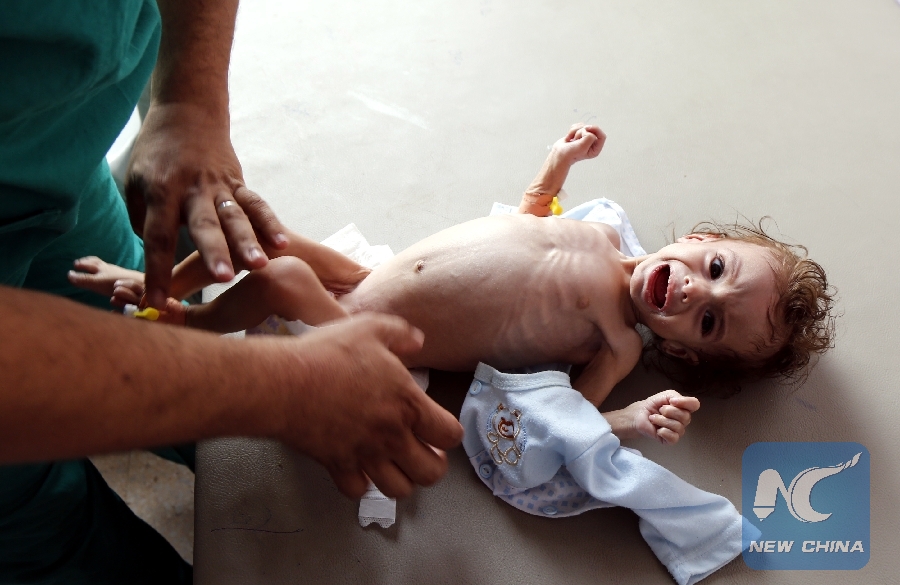
File Photo: A doctor takes a famine-suffered child's clothes to be checked at al-Sabaeen hospital in Sanaa, Yemen, on Sept. 24, 2018. (Xinhua/Mohammed Mohammed)
UNITED NATIONS, Oct. 23 (Xinhua) -- The top UN humanitarian official on Tuesday warned of "a clear and present danger" of an imminent famine in war-torn Yemen and demanded a humanitarian cease-fire to avert that.
"There is now a clear and present danger of an imminent and great big famine engulfing Yemen -- much bigger than anything any professional in this field has encountered during their working lives," UN Undersecretary-General for Humanitarian Affairs Mark Lowcock told the Security Council at a briefing.
The latest estimate is that 14 million Yemenis, some half of the total population of the country, are likely to face pre-famine conditions, where they are entirely reliant on external aid for survival, said Lowcock.
"In my update for you last month I said that an additional 3.5 million people are likely to become severely food insecure in the months ahead ...," said Lowcock, who is also the world body's emergency relief coordinator.
The number of people who rely on urgent food aid for survival now stands at 14 million, instead of 11 million, he emphasized.
While millions of people have been surviving on emergency food assistance for years, the help they get is enough merely to survive, not to thrive, he noted.
The immune systems of millions of people on survival support for years are now literally collapsing, making them, especially children and the elderly, more likely to succumb to malnutrition, cholera and other diseases, he said.
The dire situation is mainly due to fierce fighting in Hudaydah, which chokes the lifeline that aid operations and commercial imports rely on, and due to the collapse of the domestic economy, said Lowcock.
Fierce clashes have continued in Hudaydah, including intense fighting, shelling and airstrikes in the Red Sea port of Hudaydah over the last several days, he said. More than 570,000 people have been forced from their homes across the Hudaydah governorate since fighting escalated in mid-June.
Due to ongoing clashes, the eastern road from Hudaydah to the capital city of Sanaa remains blocked, which impacts trade and convoys from the key ports that serve all the population centers of northern Yemen, said Lowcock.
Clashes have also continued to block access to a milling facility that contains enough aid-financed grain to feed 3.7 million people for a month, and several humanitarian warehouses have been occupied for over two months, he said.
In the absence of a cessation of hostilities, especially around Hudaydah port, the relief effort will ultimately be simply overwhelmed, warned Lowcock.
On the economy, the central problem is that Yemen is almost entirely reliant on imports for food, fuel and medicines. And the available foreign exchange has been simply inadequate to finance adequate levels of imports to support the population, he explained.
Since 2015, Yemen's gross domestic product has halved. More than 600,000 jobs have been lost. Hundreds of thousands of civil servants and pensioners have not received regular payments since late 2016. More than 1.5 million families are no longer receiving support through public safety nets. More than 80 percent of Yemenis now live below the poverty line, he said.
To make things worse, the Yemeni government appears to be planning further restrictions on traders importing essential commodities, he said.
Traders trying to import six key commodities -- wheat, rice, sugar, milk, cooking oil and fuel oil derivatives -- are now being told that they must secure lines of credit from Yemen's central bank. But only a handful of lines of credit have been issued since June, mostly in just the last few days, he said.
Enforcement of these regulations is already having alarming effect. Two vessels carrying more than 29,000 tons of fuel have at the government's request been refused entry into Yemen in recent days.
"If current trends continue, water services and sanitation facilities will inevitably be either curtailed or cut altogether," he warned.
The government has announced that it intends to extend enforcement of the new regulations to food imports starting Nov. 9. Unless steps are taken to expedite the process or waive the new requirements, imports of key food commodities and fuel could fall by half, he said.
"That would, for reasons I have explained, be the death knell for countless innocent civilians, most of them women and children," he said.
Delays in issuing visas, restrictions on importation of equipment and cargo, retraction of permits, interference in humanitarian assessment exercises, interference in monitoring and other obstructions all limit the ability of humanitarian agencies to provide life-saving assistance to innocent civilians, said Lowcock.
He asked for the UN Security Council support in securing a humanitarian cease-fire -- a cessation of hostilities in and around all the infrastructure and facilities on which the aid operations and commercial importers rely.
"A humanitarian cease-fire would reflect the obligations of the parties to the conflict to uphold international humanitarian law and to do everything possible to facilitate the delivery of humanitarian assistance," he told the Security Council.
Lowcock also urged to protect the supply of food and essential goods across the country. Humanitarian and commercial imports must flow into all ports and onward to their final destinations. This means lifting planned and existing restrictions on imports and keeping the main transport routes open and safe, he said.
Lowcock called for a larger and faster injection of foreign exchange into the Yemeni economy through Yemen's central bank, along with expediting credit for traders, and payment of pensioners and civil servants.
He also asked for increased funding and support for the humanitarian operation and called on the belligerents to engage themselves to find a solution to the conflict.
Yemen has been in civil war in the past three years, pitting Houthi rebels and forces loyal to the government of Abdrabbuh Mansur Hadi. Saudi Arabia leads an Arab military coalition that tries to reinstate the Hadi government.

